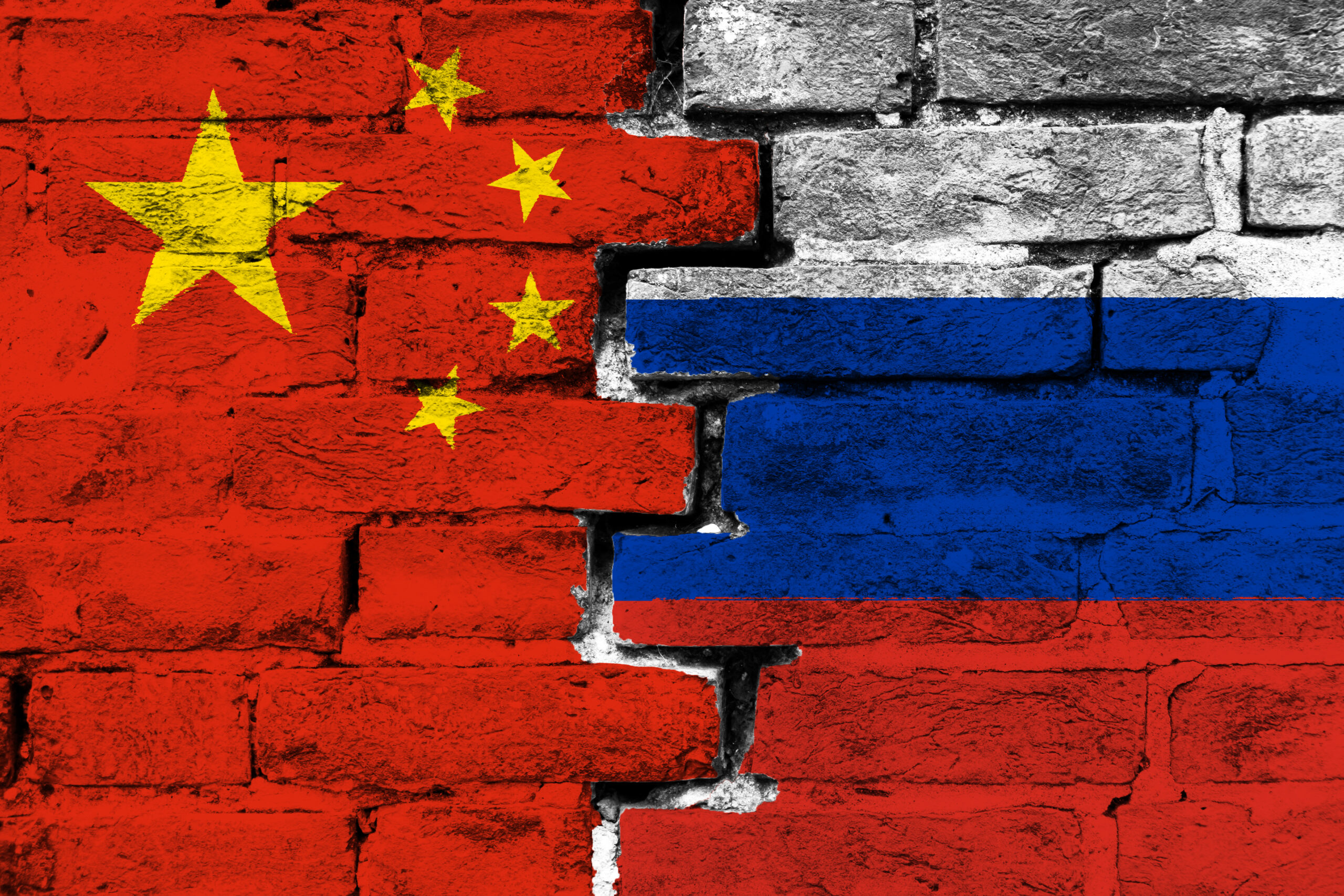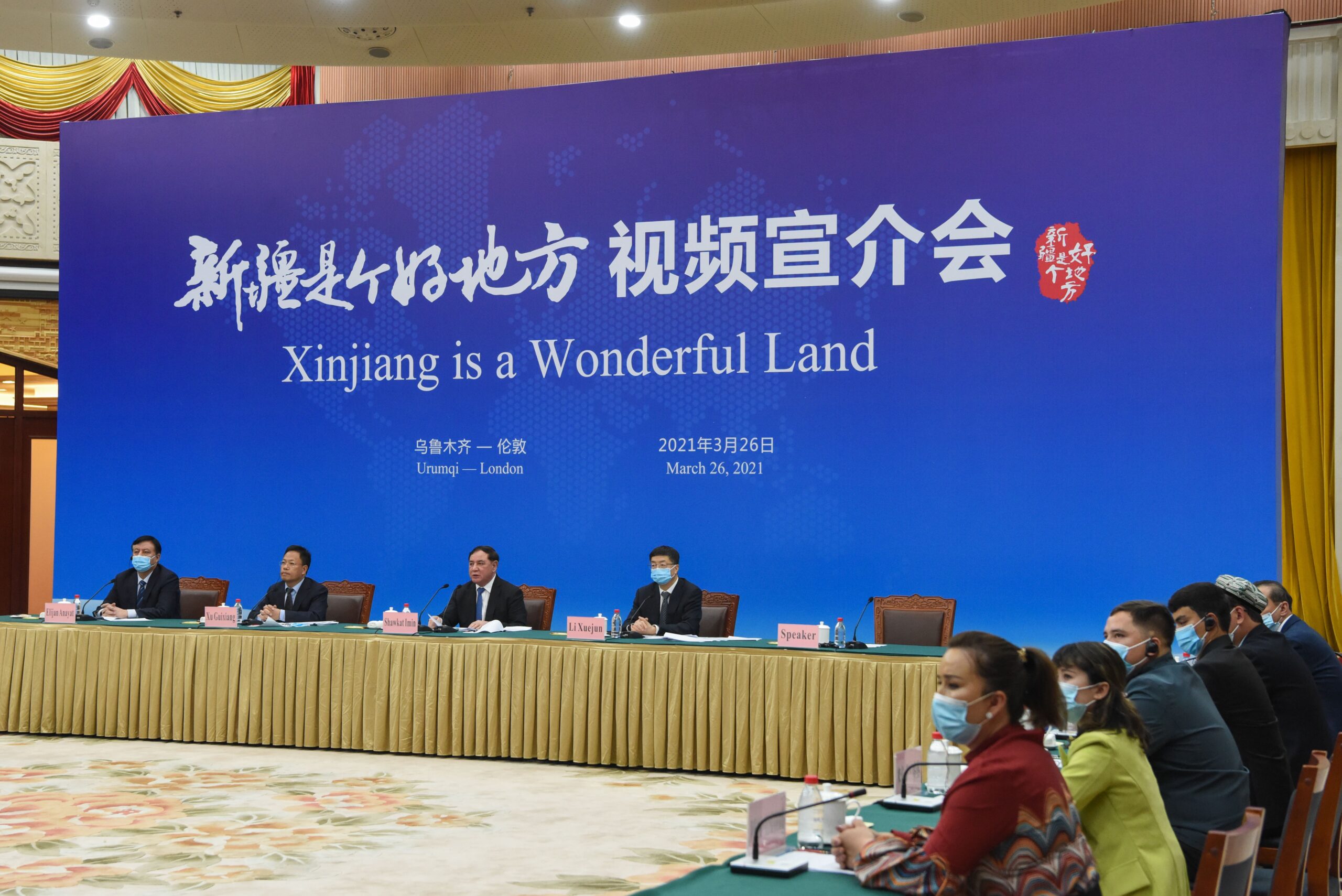By Maria Isabel Puerta Riera
One year after Russia’s full-scale invasion of Ukraine and not long after the International Criminal Court’s (ICC) decision to issue Vladimir Putin’s arrest warrant, Xi Jinping paid a state visit to Moscow. While there, Beijing released a 12-point peace proposal supposedly to end the war in Ukraine, but this plan was met with broad skepticism. The document avoided using the terms “war” or “invasion.” It implicitly placed equal blame on victim and aggressor, making the proposed plan untenable for Ukraine, as well as the EU and its partners. Such actions—along with Russia’s ‘new foreign policy concept’ declaring its preeminent role in shaping the international relations system in their antagonism against Western values—illustrate these regimes’ hostility to democratic values.
Moscow and Beijing have developed a “no limits” strategic partnership to disseminate antidemocratic narratives across the globe and they have leveraged this partnership to great effect. In line with Russian and Chinese Communist Party (CCP) efforts to assert cyber sovereignty, this partnership comprises numerous information- and media-based activities that have formalized the two countries’ commitment to exchange and amplify each other’s state media narratives.
Over the past decade, Russia and the People’s Republic of China (PRC) have operated more forcefully in the global information space. Exploiting growing weaknesses in the independent media sector, Moscow and Beijing have leveraged a wide variety of digital platforms at their disposal. They have often concealed the nature of their official and unofficial local amplifiers of these regimes’ narratives, while introducing a benign narrative of their own through Russian and Chinese official outlets. In other cases, however, there are more forceful interventions, including meddling in Latin American domestic political issues as an opportunity to attack “the West.”
Both the Kremlin and the CCP increasingly wield sharp power and information and propaganda operations to shape narratives and meddle in domestic politics abroad, especially in democratic settings. Through such influence operations, they have challenged democratic institutions and sought to sow distrust within countries around the world. There are three principal ways by which the PRC and Russia are able to disseminate and amplify narratives effectively:
- Collaboration and convergence of their narratives;
- Expansion of operations and the cooptation of illiberal allies;
- Exploitation of local and regional vulnerabilities.
The influence the Kremlin and the CCP exercise is global, but it is especially evident in Latin America. Across the region, allied governments and media—wittingly and unwittingly—disseminate illiberal narratives that question the viability of democracy on a global scale. This strategy can be found in efforts at shaping global sentiment questioning the capacity of democracies to deliver by contrasting them to the benefits their authoritarian systems purportedly offer. The practice is also present through the close ties developed between these regimes and media outlets sharing a common goal in the framing of information. In addition, there are clearly identifiable patterns concerning the mechanisms of influence operations and the targets of such action. These narratives are designed to challenge and confront what many in Latin America view as renewed imperialism and colonialism.
The Convergence of PRC and Russian Information Operations
There is a long history of Russian influence operations around the world, yet the Kremlin’s full-scale invasion of Ukraine reveals the strategic value Moscow currently places on controlling global narratives. Backed increasingly by the CCP, the complex network of media outlets disseminating pro-Kremlin views of the invasion broadly influences its authoritarian allies and uninformed actors that unwittingly propagate Russian preferred narratives.
The dissemination of the Kremlin’s narratives is not a highly sophisticated operation, but rather entails a massive, globally coordinated effort that is directed by Russian leadership. Official social media accounts share false narratives and are later echoed by allies and associates, including those affiliated with the PRC. The narrative is critical, but so is the laundering and legitimizing process of the Kremlin’s allies to infuse falsehoods more broadly across the information environment through media outlets or influencers not explicitly identified as allies. PRC-backed efforts to perpetuate these narratives further amplify Moscow’s talking points, for instance, justifying the Russian military’s mobilization before its full invasion of Ukraine and ultimately censoring anti-war voices within China’s media landscape.
Meanwhile, PRC-backed actors have focused on controlling the narrative around the Party-State’s rise as a global power. Through state-controlled media and Beijing’s online propaganda machine, the CCP has emulated Russia’s information operations playbook, pivoting away from its use of soft power toward an approach that one institution called the “Russification of Chinese influence operations.” Beijing has used these tactics to influence regional media landscapes—the Taiwanese election in 2018 being a notable example. They also rely heavily on foreign media outlets and, like Russia, invest significant effort into shaping popular narratives in countries’ domestic information spaces.
Russia’s full-scale invasion of Ukraine has exposed the PRC’s role in legitimating the conflict. While alleging neutrality, its state-controlled media amplifies Russian propaganda about its invasion of Ukraine, avoiding expressions like ”war” and adopting euphemisms like ”special operation” or crisis instead.
Expanding Russian and PRC Information Operations to Support Authoritarian Models
Recently, Russian and PRC influence operations have expanded to non-authoritarian countries worldwide—especially in the Global South. Furthermore, Beijing has been able to take advantage of its privileged position as a primary economic partner among Global South countries to garner additional support for their preferred narratives.
Kremlin- and CCP-backed information operations also reinforce information warfare by framing these efforts as defensive in nature. Both Beijing and Moscow argue that “Western” democracies have used their media and information networks to spread democratic values while unfairly vilifying their preferred models of governance. Thus, the Kremlin and the CCP explain their efforts as justified in the defense of their regimes against what they call illegitimate democratic influence in the global information space.
Authoritarian actors’ narratives adjust depending on the target region, but there is a common imperative among them: to impose the counternarrative of a thriving, authoritarian model that the West has ignored in contrast to what they call the failures of democracy. Kremlin-friendly platforms share these messages with audiences worldwide, making inroads across Latin America, Africa, and beyond. The intention is not so much to uphold or promote Russian or Chinese regimes as better options, but to sow distrust in democratic governance models, creating sufficient confusion among those most frustrated with the poor performance of their governments and institutions.
Local and Regional Vulnerabilities
The effectiveness of these efforts depends on a range of systemic factors, including the openness of a country’s media environment, social and political polarization, and the resilience of democratic institutions. In countries with weak democratic institutions and polarized populations, authoritarian actors are more successful in undermining democratic practices.
In Latin America, the region’s “calculated ambiguity” (source material in Spanish) emphasizes the profound political influence of alternative narratives that these two illiberal forces push. The neutral stance some of these countries have adopted regarding the Ukrainian conflict is evidence of the impact of these forces, adopting the argument of the proxy nature of the conflict as an excuse for neutrality. Brazilian President Luis Inácio Lula da Silva’s recent comments after his trip to Asia accusing the U.S. of “encouraging the war” have further underscored Latin American implicit alignment with Russia and the PRC over the conflict.
Colombia’s president Gustavo Petro’s refusal to supply Russian-made military equipment to Ukraine and Mexico’s Andrés López Obrador insistence on a ”peace plan” between Russia and Ukraine signal that economic and political interests—backed by Russian and CCP narratives in Latin America—have, in some cases, outweighed concerns over sovereignty and self-determination. This stance belies the region’s long-standing sensitivity to the historical legacies of colonialism and imperialism.
Alternative narratives like those mentioned above advance falsehoods and compromise potential democratic voices in Latin America. Support by some in Latin America of the false pretenses under which Russia invaded Ukraine has left global democracy more vulnerable than ever to malign information operations. Furthermore, the distrust these narratives sow in media and democratic institutions could cause irreparable damage in the absence of a more robust response.
It is vital to acknowledge these threats and educate audiences to be more aware of them. These efforts should include supporting media literacy programs in the long term and passing legislation protecting the information environment from authoritarian actors. The impact of authoritarian information operations on discourse, however, necessitates short-term measures involving socially-shared mechanisms that inform readers of media outlets’ credibility. In this sense, nongovernmental actors are critical in providing easy-to-use safety tips that can support users. The activities our institution (GAPAC) has organized that promote tools for civil society to better manage communication complexities represent one notable example of effective civic engagement. Through this initiative, citizens from local organizations learn how to identify malign information operations while receiving training on techniques that enhance civic participation capacities, with the support of infospace experts and other activists. While only a single effort, the expansion of such initiatives, as well as others, will be critical to effectively responding.
Russian and PRC partnership in the information realm has allowed the emergence of a powerful synergy with severe consequences in Latin America. In their efforts to reshape global narratives, the alliance is reaching an audience that is vulnerable due to the weak nature of its democracies. The effectiveness of practices designed to sow distrust in the values and principles of the region’s political systems seems to be paying off with the uneven reaction to conflicts like the War in Ukraine, among other examples. In the information era, it can be a tool for self-harm or protection if consumers know its power. Therefore, it is not surprising that Spanish-speaking Russian media has impacted the region’s information space. The lack of awareness about this trend highlights the need to be more aware of the threat these actors pose to Latin American political stability. We must educate audiences relentlessly and provide the instruments they need to detect and combat malign information operations and, ultimately, to protect their own democratic structures.
Maria Isabel Puerta Riera is a research fellow at GAPAC and an adjunct professor of political science at Valencia College. Follow her on Twitter: @Maripuerta.
The views expressed in this post represent the opinions and analysis of the author and do not necessarily reflect those of the National Endowment for Democracy or its staff. Image Credit: LukeOnTheRoad/Shutterstock.






